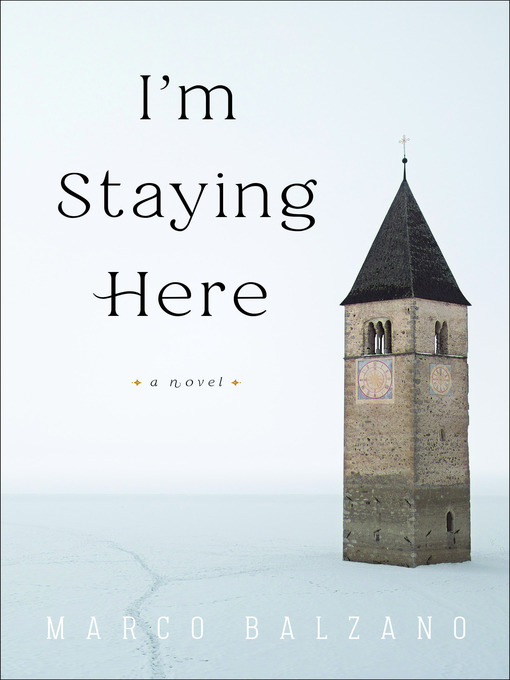
I'm Staying Here
A Novel
کتاب های مرتبط
- اطلاعات
- نقد و بررسی
- دیدگاه کاربران
نقد و بررسی

October 1, 2020
Translated from the Italian, this desperately sad novel charts the fraught lives of Erich and Trina, subsistence farmers in South Tyrol in the 1930s and '40s. The couple's troubles begin when their young daughter, scarcely more than a girl, runs away to live in Germany with her aunt and uncle. Her parents will hear from her only once in the years that follow. In time, their small village is overrun by the Italian Fascists, who conscript Erich and send him off to war. Wounded, he survives, just in time for the Nazis to invade. Erich and Trina flee to the mountains where?always near starvation?they somehow survive the war. Returning to their village, they find another horror waiting: a long-rumored dam is finally being built, which will flood their village and leave them displaced persons. Erich fights the plan urgently, but will he succeed against overwhelming odds? Sometimes affectless, the voice is relentless in its account of survival beset by setbacks. The result is haunting and powerful in its nearly existential approach to life.(Reprinted with permission of Booklist, copyright 2020, American Library Association.)

October 5, 2020
A mother living through the early days of WWII in northern Italy writes to her absent daughter, in Italian author Balzano’s quietly devastating English-language debut. As a teenager and aspiring teacher in the village of Curon in 1923, Trina must switch to studying Italian after Mussolini, who annexed the region the year before, forbade the use of German. After Trina’s marriage to Erich, she fails to land a teaching job and begins secretly teaching German until, in 1939, “Hitler’s Germans” offer residents “the Great Option”: join the Reich and leave Italy. Many locals take up the call, but Trina and her husband stay, only to discover that their young daughter, Marica, elects to leave with an aunt and uncle. The narrative is framed as Trina’s letter to Marica, with heartbreaking accounts of her attempts to escape from the advancing Germans in 1943, and of the potential construction of a dam approved by Mussolini before he was deposed, which would condemn their villages to “disappear in a watery grave.” The writing can be simplistic, but Balzano’s unvarnished approach heightens the poignancy of a story based on real events: after the dam was built following the war, all that’s left of Curon today is a bell tower. This tale of destruction is a blunt reminder of war’s ability to destroy: a village, a way of life, and, in particular, a family.

October 1, 2020
The (now) seemingly idyllic Italian region of the South Tyrol serves as the backdrop for the decades of tumult--personal and political--recounted to an absent daughter in Balzano's saga of politics, war, and engineering. Trina enjoys a fairly uneventful life, despite a strained relationship with her mother, in the agrarian South Tyrol until her adolescent dreams of becoming a teacher are thwarted with the arrival of Mussolini and fascist control of the region. Despite the restrictions placed on the Germanic residents of the area and rumors of a long-planned dam project revived by Mussolini, Trina's family and her husband, Erich, opt to remain in their homeland. As the Second World War approaches and the region becomes a deadly pawn in the expansion of Hitler's Reich, Trina's rapidly disintegrating family suffers unimaginable hardships which are exacerbated to a hideous degree during the war itself. The miseries endured by the region's residents do not stop with the end of the war, and Balzano's stoical narrator continues with the litany of indignities visited upon them. As if a war were not enough to endure, the constrained roles of women within a traditional agrarian society leave little room for disagreement with male decision-makers. Trina's long-held belief that words could save her is tested by vicious forces, some within her extended family (who assault her with actions stronger than words). Trina's matter-of-fact narration maintains a steady tone while recounting decades of inhumane circumstances to a ghostly lost daughter. While the catalog of insults may appear unending to some, Balzano illuminates a war waged upon the South Tyrol even after "the war" was over. Balzano recites horrors in a cool, unvarnished tone, cataloging a life upended by war and, worse, by its remembrance.
COPYRIGHT(2020) Kirkus Reviews, ALL RIGHTS RESERVED.

December 1, 2020
Balzano sets his fourth novel in the village of Curon in South Tyrol after this largely German-speaking province's 1919 annexation by Italy, and readers rightly expect--and get--a heartfelt saga about the villagers facing their oppressive new Italian overlords and later the trouble that comes with Hitler's rise to power. But as Balzano explains in an author's note, the novel was initially inspired by his visit to the actual town, now submerged but for its belltower after the construction of a dam that we see threatening his characters as well. The story is related by Trina, whom readers first meet as a young woman defying the Italians to teach German clandestinely; she relates the story as if she were speaking to her daughter, who fled to Germany in the interwar years in search of a better life. By 1939, residents of the province are split by Hitler's invitation to leave for the Reich, with Remainers like Trina and her husband roundly regarded with suspicion. When World War II descends, the couple flees for the mountains in a down-to-the-bone effort to survive, even as their son supports Hitler. VERDICT Fresh history and an ongoing sense of loss told in unadorned, surprisingly low-key language; for readers who take their historical fiction seriously.
Copyright 2020 Library Journal, LLC Used with permission.

























دیدگاه کاربران